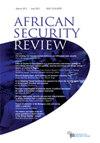Gratuitous benefit for the ZANU-PF government? Securitisation of COVID-19 and authoritarian politics in Zimbabwe
IF 1.1
Q3 INTERNATIONAL RELATIONS
引用次数: 0
Abstract
ABSTRACT This article examines how the securitisation of COVID-19 helped the ZANU-PF government to consolidate power. It uses data collected from various document sources such as news outlets, social media platforms, and websites. Additionally, the researchers conducted informal interviews with Zimbabweans through social networking platforms. The study found that the measures the government (securitising actor) adopted to contain the coronavirus did not match the degree of the threat and noted glaring discrepancies between what the government said and its actions. In addition, the implementation of the COVID-19 measures indicates that the ruling party sought to achieve other agendas other than protecting the public (referent objects). The administration used extraordinary measures associated with curbing the spread of COVID-19 as a cover to decimate the opposition coalition, Movement for Democratic Change-Alliance (MDC-A), and consolidate power through the politicisation of food, harassment of those who broke the lockdown measures, prevention of anti-government protests, postponement of elections, and constitutional amendments.ZANU-PF政府的无偿福利?新冠肺炎证券化与津巴布韦威权政治
摘要本文探讨了新冠肺炎的证券化如何帮助非洲民族联盟-爱国阵线政府巩固权力。它使用从新闻媒体、社交媒体平台和网站等各种文件来源收集的数据。此外,研究人员通过社交网络平台对津巴布韦人进行了非正式采访。该研究发现,政府(证券化行为体)为遏制冠状病毒而采取的措施与威胁的程度不匹配,并指出政府的言论与行动之间存在明显差异。此外,新冠肺炎措施的实施表明,执政党寻求实现除保护公众(公民对象)之外的其他议程。政府利用与遏制新冠肺炎传播相关的非常措施作为掩护,摧毁了反对派联盟民主变革联盟运动(MDC-a),并通过食品政治化、骚扰违反封锁措施的人、防止反政府抗议、推迟选举、,以及宪法修正案。
本文章由计算机程序翻译,如有差异,请以英文原文为准。
求助全文
约1分钟内获得全文
求助全文

 求助内容:
求助内容: 应助结果提醒方式:
应助结果提醒方式:


